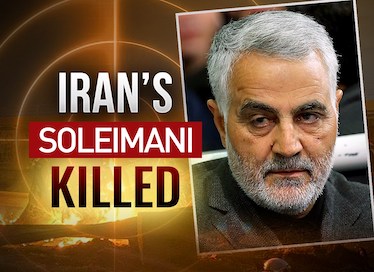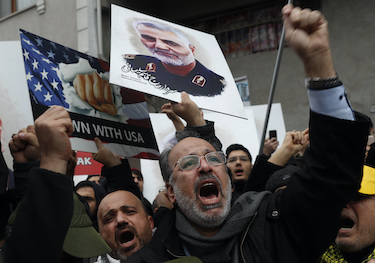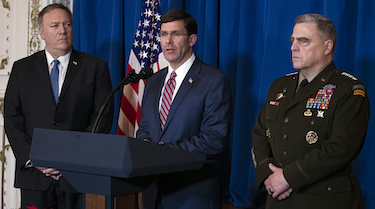‘It’s an act of war’ Fear that U.S. assassination of Iranian general will escalate into all-out military conflict
By Brian E. Muhammad Staff Writer @globalpeeks | Last updated: Jan 7, 2020 - 12:44:06 PMWhat's your opinion on this article?
Has the U.S. assassination of a popular military leader set the stage for all-out war between Iran and the United States after decades of tension and proxy battles?

Worldwide attention was focused on the Middle East and reports from Washington and Tehran with anger and uncertainty the only things that appeared certain.
The United States killed Gen. Qassem Soleimani, the top military leader of the Islamic Republic of Iran, in a brazen drone strike at Baghdad International Airport in Iraq. The Pentagon, in a statement Jan. 2, said the targeted killing was ordered by President Donald Trump, who confirmed ordering the attack Jan. 3. The attack also killed several others including Abu Mahdi Al-Muhandis, the deputy commander of the Popular Mobilization Forces, a pro-Iran militia in Iraq.
“At the direction of the President, the U.S. military has taken decisive defensive action to protect U.S. personnel abroad by killing Qassim Soleimani, the head of the Iranian Revolutionary Guard Corps-Quds Force, a U.S.-designated Foreign Terrorist Organization,” the statement read in part.
The Pentagon statement and Secretary of State Mike Pompeo told news media the assassination was justified. They claimed Gen. Soleimani was actively developing plans to attack American diplomats and service members in Iraq and throughout the region. The U.S. maintained the 61-year-old military man and Quds Force leader was responsible for hundreds of U.S. and coalition service members’ deaths and the wounding of thousands more.
“They’re saying that Soleimani was planning attacks against Americans, but we don’t know if that’s true or not. It’s just an excuse to take out an Iranian official,” said David Ottaway, a Middle East Specialist at the Woodrow Wilson Center in Washington, D.C.
But killing Mr. Soleimani in the worsening situation was a game changer, he added. “Because now we’ve attacked a senior member of the Iranian government, brazenly and openly,” said Mr. Ottoway.
“Iranians are almost forced to react in retaliation,” he told The Final Call.
He also believes the Iranian reaction would partly be diplomatic, such as pressing the Iraqi government to expel the American military.
“But, I think they’re also going to retaliate physically ... not just diplomatically,” said Mr. Ottoway.
When asked about implications of the assassination on U.S. regional allies like Saudi Arabia and Israel, the analyst said it altered how U.S. friction with Iran will play out moving forward.
“It’s a different nature; the conflict is becoming more directly U.S. versus Iran rather than ‘U.S. allies’ versus ‘Iranian proxies,’ ” explained Mr. Ottoway.
Phyllis Bennis, director of the New Internationalism Project at the Institute for Policy Studies, agreed Iran is being pushed to respond to the attack.
“The Iranian leadership will clearly be under domestic pressure to respond forcefully to Soleimani’s assassination—and with Iran essentially surrounded by U.S.-backed governments and major U.S. military installations, they have a plethora of potential targets,” said Ms. Bennis. “The real question will then be how will the Trump administration respond to Iran’s inevitable payback?”
Ms. Bennis pointed out in a Nation magazine article that the near war situation is rooted in failed U.S. policy in Iran, the aftereffects of President Trump’s withdrawal from the 2015 Iranian nuclear deal and renewal of crippling anti-Iranian sanctions.

“The U.S. policy of ‘maximum pressure,’ which the administration imposed after abandoning the nuclear deal, relies on economic sanctions hurting the people of Iran, as well as U.S. military threats and feints just short of direct military attack,” wrote Ms. Bennis.
Others say the Trump administration acted illegally, violating the Constitution, the War Powers Act and international law. Although there was bipartisan agreement on the target of the assassination, some criticism came from Democratic lawmakers.
“Tonight’s airstrike risks provoking further dangerous escalation of violence. America—and the world—cannot afford to have tensions escalate to the point of no return,” said House Speaker Nancy Pelosi in a Jan. 2 statement.
She derided the attack for happening without congressional authorization for military action. Her statement accused President Trump of placing American service members, diplomats and others at risk by engaging in “provocative” and “disproportionate” action.
Presidential hopeful and former vice president Joe Biden joined other worried Democratic presidential hopefuls saying President Trump “tossed a stick of dynamite into a tinderbox” with the killing of the general.
R
epublicans lauded the decision: “I appreciate President Trump’s bold action against Iranian aggression. To the Iranian government: if you want more, you will get more,” declared Sen. Lindsey Graham of South Carolina via Twitter. Sen. James Inhofe, chairman of the Senate Armed Services Committee, said, “America does not and should not seek war, but it will respond in kind to those who threaten our citizens, soldiers and friends—as the President has long promised. De-escalation is preferable and possible—but only if our adversaries choose it.”

Where the U.S. action will specifically lead is unclear but there is broad agreement that Americans in the region are more vulnerable. Although the Pentagon and the State Department claimed the attack was to protect Americans and regional allies, Washington issued a frantic Jan. 3 alert ordering “all Americans” out of Iraq “immediately” via airlines where possible and, if that fails, by fleeing to neighboring countries via land.
“It’s a decision that I think ultimately has made America less, rather than more, safe,” Trita Parsi, executive director of the Quincy Institute told Democracy Now.
“I think that’s clear from the decision by the State Department today to urge all Americans to immediately leave Iraq,” he added.
The assassination came on the heels of augmented hostility between America and Iran that escalated in Baghdad with violent New Year’s Eve protests at the U.S. Embassy by pro-Iranian groups. The two-day embassy siege was followed by President Trump signing off on additional U.S. soldiers deployed to the region. It was reported Jan. 3 that thousands more American troops had been shipped into the area.
The anti-American embassy protest was a response to U.S. airstrikes days before that killed 25 fighters of Kataeb Hezbollah—an Iraqi militia group aligned with Iran. The Pentagon said the strikes were in retribution for the death of an American contractor in a late December 2019 rocket attack at an Iraqi military base the U.S. blamed on the group and which denied the attack.
Killing General Soleimani, who was a national hero in Iran, opened the door to a much wider conflict.
Iran’s President Hassan Rouhani called the killing of the Revolutionary Guard commander a “heinous crime.” “The great nation of Iran will take revenge” for the U.S. airstrike near Baghdad’s airport, Mr. Rouhani said Jan. 3. Iran’s president added that “the path of resistance to U.S. excesses will continue.”
The Associated Press reported outgoing Iraqi Prime Minister Adel Abdul-Mahdi condemning the attack which also killed Iraqis.
“Liquidation operations (assassinations) of leading Iraqi officials or from a friendly country on Iraqi soil is a brazen violation of Iraq’s sovereignty and blatant attack on the nation’s dignity,” Mr. Abdul-Mahdi said.
The Leader of the Islamic Revolution, Ayatollah Seyyed Ali Khamenei, said, the “cruelest people on earth” assassinated the “honorable” commander who “courageously fought for years against the evils and bandits of the world.”
The Iranian cleric vowed revenge aimed at those who have the blood of General Soleimani and other martyrs on their hands. “Martyr Soleimani is an international figure of the resistance, and all the devotees of resistance are now his avengers,” he said.
General Soleimani was credited with masterminding the defeat of terrorist forces, like ISIS, and keeping the group from spreading in Iran and other parts of the region. Mr. Soleimani was revered as a national hero and throughout the region for his contribution against foreign domination, like America and terror forces, making the pain of his loss cut deep. Many may want to harm Americans over the assassination, said analysts.
“All the friends and foes must know that the path of Jihad of the resistance will continue with double motivation,” vowed Ayatollah Khamenei before declaring a three-day period of mourning.
Nation of Islam Minister Louis Farrakhan, who has visited Iran twice in recent years, has continually urged the Muslim World to find a path of reconciliation and a way to end armed conflict. He has warned allowing outsiders to pit Sunni and Shiite Muslims against one another only results in disasters.
He has also been unflinching in warning American presidents to stop their warmongering in the Middle East, plots for regime change and assaults on Iran. An American war with Iran will be a disaster and it is a conflict the U.S. cannot win, Min. Farrakhan has said.
“They’re trying to provoke Iran,” said Minister Farrakhan during a major address last summer in Chicago. “I would like to say to the president, Mr. President, it would not be a wise move for you because you’re already $23 trillion in debt and you don’t have any money to prosecute a war. So, if you don’t have the money to prosecute a war, the Federal Reserve is printing money every day. So, you will have to come to the Federal Reserve to borrow money that you don’t have to prosecute a war in a time when any little thing could cause the dollar to fall and stocks to fall.”
Min. Farrakhan has also told Blacks they should not join the armed forces and engage in any war for the United States, particularly a war with Iran.
“America’s about to go to war. And when she goes to war, she wants Black and Brown bodies. Now, you’re useful. They don’t give a doggone about how Black Lives Matter until they want to use Black Lives to accomplish their wicked ends,” he said.
INSIDE STORIES AND REVIEWS
-
-
About Harriett ... and the Negro Hollywood Road Show
By Rabiah Muhammad, Guest Columnist » Full Story -
Skepticism greets Jay-Z, NFL talk of inspiring change
By Bryan 18X Crawford and Richard B. Muhammad The Final Call Newspaper @TheFinalCall » Full Story -
The painful problem of Black girls and suicide
By Charlene Muhammad -National Correspondent- » Full Story -
Exploitation of Innocence - Report: Perceptions, policies hurting Black girls
By Charlene Muhammad -National Correspondent- » Full Story -
Big Ballin: Big ideas fuel a father’s Big Baller Brand and brash business sense
By Bryan Crawford -Contributing Writer- » Full Story






 Click Here Stay Connected!
Click Here Stay Connected!








